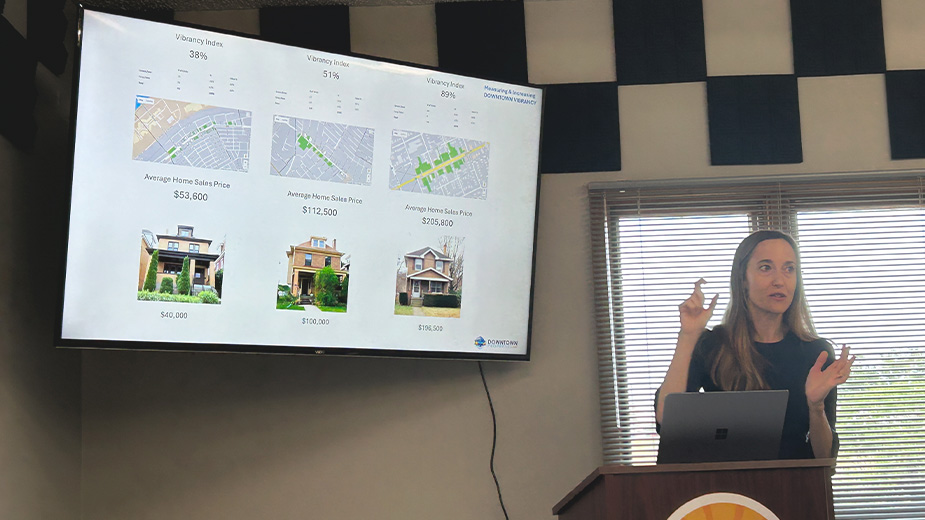YBI’s Williams to Fed Chair: Minority Businesses Need ‘Intentional Relationships’ with Banks
YOUNGSTOWN, Ohio – Carmella Williams’ belief that opportunity can be found in any situation was on full display Friday during a virtual forum (RELATED STORY) with the chairman of the Federal Reserve and president and CEO of the Federal Reserve Bank of Cleveland.
Williams, director of diversity and inclusion, Youngstown Business Incubator and owner of Carmella Marie Inc., was optimistic in outlining support she sees as necessary for minority and women owned businesses in the wake of the GM Lordstown plant closing and recent shutdowns related to the coronavirus pandemic.
“I always have the mindset that any obstacle really can be an opportunity. There’s just different ways to pivot,” she said.
When Ohio began shutting down because of the pandemic, business counselors at YBI created individual training opportunities to help owners learn “to pivot, and switch from brick and mortar to e-commerce,” she told Jerome Powell, Fed chairman, Loretta J. Mester, president and CEO of the Federal Reserve Bank of Cleveland, and local business leaders.
The virtual forum was meant to gain insight into how communities with ongoing economic struggles figure out ways to move forward in the era of COVID-19.
“Information we collect from community and business sources is really crucial to us as we set monetary policy and as we look at our tools and how we use them to set the stage a robust and inclusive economic recovery,” Mester said.
Williams spoke from her knowledge as a Black, female small business owner as well as her role in counseling entrepreneurs at YBI, hosting the Minority Business Assistance Center and the Women in Entrepreneurship Program at YBI. Her background provided a different meaning to inclusive economic recovery when it comes to opportunity and access for minority business owners, steps that can be taken to rectify the inequality and strengthen the Mahoning Valley economy through entrepreneurship.
“Intentional relationships need to be formed with the minority community from a banking prospective,” Williams said. “From what I saw on the ground, companies that did not have a personal banker did not get PPP [Paycheck Protection Program funding]. Applications either weren’t accepted or they weren’t eligible. A lot of small business owners file 1099s and not actual payroll. Some did get the EIDL [Economic Injury Disaster Loan], but only $10,000 was forgivable. Many small businesses are missing out on PPP because they have no employees and that is why some are not applying. I would like to see that expanded.”
Williams also said she would like to see more diversity with anchor institutions such as hospitals, schools and cities purchasing from women and minority owned businesses. This would help to support a sustainable workforce.
“If we could increase the number of businesses that have just one person getting paid from it to two people, that could be substantial for the Mahoning Valley,” she said.
Nick Chretien, program manager for Economic Action Group, which provides economic development and entrepreneurship assistance with a focus on downtown, said his organization is working to make small business owners aware of assistance and community development programs in the wake of COVID-19.
EOG had to shift its focus because of the coronavirus, he explained. Chretien sees the demand for space slowly starting to pick back up, but at the beginning of the crisis, it was a tough time for businesses to locate downtown, expand or make large-scale investments in the community.
“We found assistance from local foundations that created the Mahoning Valley Community Response Fund, which was huge in the local response,” he said.
By refocusing efforts on resources and support for businesses that employ essential workers, the Economic Action Group was able to track data for a targeted recovery. The group reached out to 1,800 businesses and received 720 responses.
“We’ve certainly seen the impact of these programs making a positive impact on the region,” Chretien said. “We’ve seen it from the very early onset of the pandemic.”
He pointed out that 15% of the businesses EOG contacted took advantage of resources and more are still applying.
Moving forward, Chretien said the data will determine who is the most impacted by the virus, which sectors disproportionately suffered, and identify programming to “foster a more inclusive ecosystem for entrepreneurship in the Mahoning Valley.”
Entrepreneurs did receive help through the YBI, which created one-on-one training opportunities, Williams noted.
“We provided cross-marketing opportunities for businesses who might not have had a predominantly white customer base ,” she said. “By doing that, more of the community became aware of them, helping to increase sales.”
She gave examples of an entrepreneur who used 3D printing in the dental industry. When business shut down, she pivoted to create personal protective equipment for frontline workers. Another beauty supply company added an online section to sell essential items such as disinfectant wipes and hand sanitizer.
Powell asked Williams how minority and women owned businesses are faring as the economy reopens.
Williams said entrepreneurs had to think of creative solutions to generate capital to pay monthly bills, but many learned new marketing skills and went from face-to-face meetings to contacting clients through emails, texts and developing online sales platforms.
“I think we’re going to see more rallying around black owned businesses. A lot of people are being intentional about supporting black owned businesses. Right now people are more aware of the inequality and that racism affects us all,” she said.
Williams also noted the Juneteenth celebrations being held this weekend in Youngstown and next weekend, Warren’s Juneteenth event will feature a black business expo.
Powell acknowledged the call was taking place in the midst of immense hardship from coronavirus.
“Lives and livelihoods have been lost and uncertainty looms large. While we’re all effected, the burden has fallen disproportionately on those least able to bare it,” Powell said.
Youngstown Mayor Jamael Tito Brown agreed, economic disparities have long existed in minority communities, but the health crisis magnified the problem.
He cited hardships that essential workers faced in finding transportation to get to work, health disparities in minority communities that led to higher numbers of positive cases of COVID-19 and deaths in long-term care facilities.
“Those were some of the barriers they faced that we really didn’t pay attention to until COVID-19 came about,” Brown said.
“Our eyes are [open] wider now. Not just in Youngstown or the state of Ohio, but across the nation,” the mayor said.
Following the virtual forum, Williams said she believes her voice representing women and minorities was heard, especially when it comes to banks creating better partnerships with the black community. A jumping off point would be for the federal government to continue offering minority and women owned small businesses $10,000 loans at the 3.75% interest rate similar to the EIDL loans, she said.
“It’s already a population of individuals who’ve been disenfranchised and who don’t have all that they need, so they need to have a hand up,” Williams said. “If you’re talking about investing into the black small business community, we need to enact something that’s not just for disaster [relief] but for the rebuilding of the true wall street.”
RELATED:
Fed Chair Told Foundation of Collaboration Supports Valley
Copyright 2024 The Business Journal, Youngstown, Ohio.


